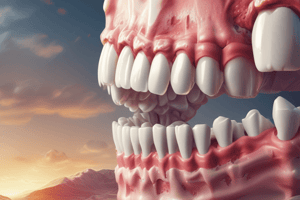Podcast
Questions and Answers
What is attrition?
What is attrition?
- The normal functional aging process of teeth
- The transmission of forces generated during occlusion and mastication
- The loss of tooth structure caused by tooth-to-tooth contact (correct)
- The loss of tooth structure in the cervical neck area of the teeth
What are the areas most affected by attrition?
What are the areas most affected by attrition?
- Arch length
- Cervical neck area of the teeth
- Occlusal surfaces of the posterior teeth and incisal edges of the anterior teeth (correct)
- Interproximal contact points of the teeth
How can attrition be recognized?
How can attrition be recognized?
- Flattening of the normal rounded contour and polished appearance (correct)
- Transmission of forces generated during occlusion and mastication
- Wedge-shaped areas of enamel loss
- Severe loss of tooth structure
What is abfraction?
What is abfraction?
How is abfraction produced?
How is abfraction produced?
What is the main cause of attrition?
What is the main cause of attrition?
How is attrition different from abfraction?
How is attrition different from abfraction?
What distinguishes severe attrition from normal aging process?
What distinguishes severe attrition from normal aging process?
What forces contribute to the production of abfraction?
What forces contribute to the production of abfraction?
Which area of the teeth is most affected by attrition?
Which area of the teeth is most affected by attrition?




